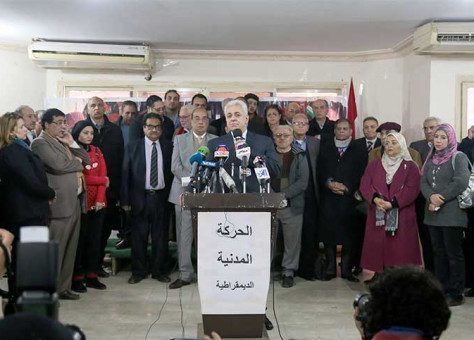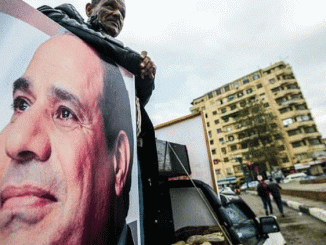
After it ousted the military competitors from the political scene, al-Sisi military regime enters a new confrontation with the same politicians who supported al-Sisi’s military coup against Mohamed Morsi. Now the leaders of the National Salvation Front, which brought al-Sisi to power, turned recently to conspirators because they just opposed him.
The National Salvation Front was an alliance formed secular political parties to oust Egypt’s first democratically elected president Mohamed Morsi.
Egypt’s prosecutor general has launched an investigation into leading opposition figures who have called for a boycott of next month’s presidential election, over accusations they are attempting to “overthrow the regime.”
In a statement this week Nabil Sadeq’s office said it had referred a complaint filed against 13 individuals by a lawyer named Mohammed Hamid Salam to the Giza prosecutor’s office, which may now call them in for examination.
The move is yet another sign that authorities will not allow even the slightest questioning of Abdel-Fattah al-Sisi’s continued rule ahead of the March vote, in which he is the only serious candidate despite a last-minute bid launched by a supporter.
A coalition of eight opposition parties and some 150 prominent pro-democracy figures, including former presidential candidate Hamdeen Sabahi, announced a boycott last month. The complaint accuses them of “incitement against the state” and trying to destabilize the country.
The Egyptian authorities have waged a sweeping crackdown on dissent since al-Sisi led the military overthrow of the first elected president in 2013, and pro-government media routinely portray dissent as part of a foreign conspiracy to sow chaos.
Khaled Dawoud, head of the Constitution Party and one of the boy cotters, denied the allegations in a Facebook post, saying that such “lies” themselves were incitement and that he “cannot understand what the prosecutor general is concerned about.” Dawoud is an outspoken critic of what he calls the current wave of “oppression.”
Former lawmaker Mohammed Anwar Sadat, a nephew of assassinated Egyptian leader Anwar Sadat, said Egypt needed a national dialogue and “real independent institutions” in order to “avoid escalations and clashes.” Sadat had considered running but cancelled his bid last month, saying he feared for the safety of his supporters.
He said in a statement, “The political freeze that we are living, which is similar to a blood clot around the heart, if left uncontrolled, the whole body will be in danger.”
The complaint now under investigation says that by holding a press conference to call for a boycott, the group besmirched Egypt’s image at home and abroad. But democracy advocates have already roundly dismissed the election.
“Having presided over four years of consolidation of power, eliminating any real opportunity for the opposition in the upcoming presidential elections and achieving near full control over the media, al-Sisi has effectively guaranteed his victory,” wrote Nancy Okail of the Washington-based Tahrir Institute for Middle East Policy in a report on the election released Monday.
Al-Sisi says the March 26-28 vote should be considered legitimate, and that the country’s security and economic recovery should take precedence over political freedoms.
In fact, he is the only serious contender, after several prominent figures were arrested or withdrew. Al-Sisi only opponent is a little-known politician who supports him and whose eleventh-hour entry is widely seen as a face-saving move to avoid the spectacle of a single candidate referendum.
The election itself will be held over three days in what critics say is an attempt to maximize participation from an uninspired public. In poorer areas, pro-government notables and businessmen have offered voters food and cash to register their support for al-Sisi.



